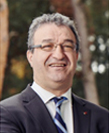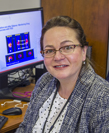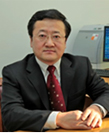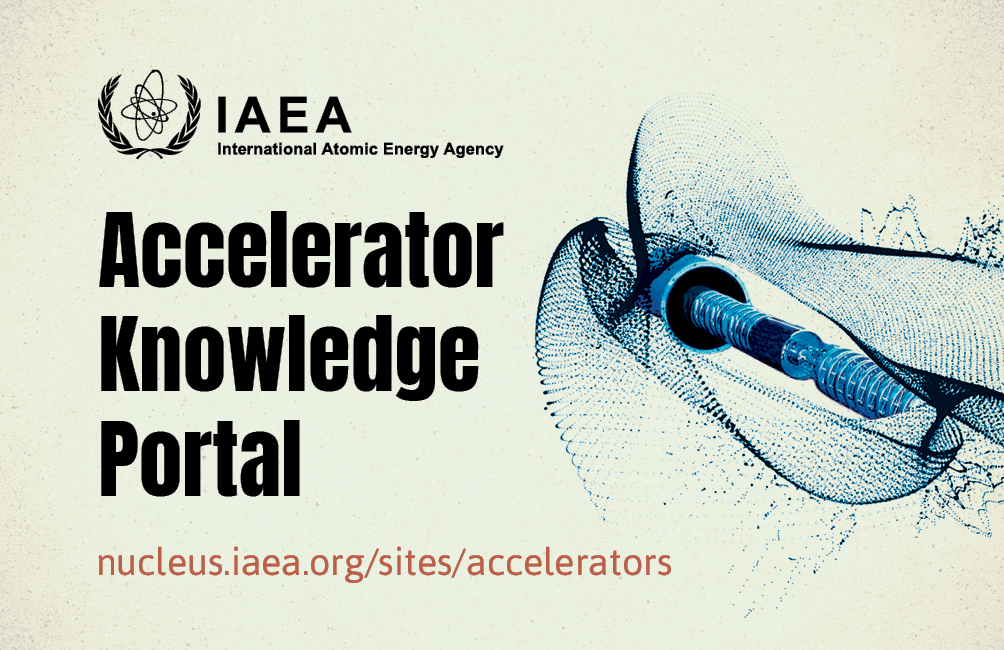Plenary Speaker?Biographies

Hamid A?t Abderrahim
International Relations,
Deputy Director General
MYRRHA project, Director
Prof. Dr. Hamid A?t Abderrahim is the Deputy Director General International Relations of SCK?CEN, the Belgian nuclear research centre. He is also professor of reactor physics and nuclear engineering at the ?Universit? Catholique de Louvain? (UCL) at the mechanical engineering department of the ?Ecole Polytechnique de Louvain (EPL)?.
His fields of specialization are Reactor Physics, Reactor Dosimetry, Nuclear Fuel Cycle, Partitioning and transmutation of high level nuclear waste and Nuclear Reactor Technology.
Since 1998 he is the director of the MYRRHA project: an accelerator driven system coupling a sub-critical Pb-Bi cooled reactor and a high power proton accelerator through a spallation target.
Since 2015 he is the chairman of the Governing Board of SNETP.

Keith M. Anderton
Counselor for Nuclear Affairs, U.S. Mission
to International Organizations in Vienna?
Mr. Anderton is currently Counselor for Nuclear Affairs at the U.S. Mission to International Organizations in Vienna.? Previously he served as Political Counselor at Embassy Bangkok, Deputy Political Minister in Beijing, EUR Deputy Director for Scandinavia and the Baltic States, and First Secretary at the U.S. Mission to NATO, where he oversaw the NATO-Russia Council.? Other assignments include Russian Foreign Policy expert in the Office of Russian Affairs, Economic Officer and later Senior Staff Assistant to Ambassador Thomas Foley at U.S. Embassy Tokyo, and Oil and Natural Resources Officer at U.S. Embassy Moscow.? Prior to joining the Foreign Service, Mr. Anderton was briefly an academic, with postdoctoral fellowships at both the Free and Technical Universities in Berlin, Germany.? He was a Fulbright Scholar to Tokyo University and a visiting lecturer in the Values, Technology, Science and Society program at Stanford University.? He holds Ph.D. and M.A. degrees from Harvard in the History of Science and Astrophysics, respectively; and a Bachelor?s degree in Theoretical Physics from Princeton. ? Mr. Anderton speaks Chinese, Russian, Japanese, German, French, and Thai.? He is married to Frances Therese Anderton and has three children.

Lo?c Bertrand
Physicist, SOLEIL synchrotron,? Universit? Paris-Saclay (France),
Science Director, European Research Infrastructure for Heritage Science (E-RIHS, preparatory phase)
Lo?c Bertrand is a physicist at the SOLEIL synchrotron and at the Universit? Paris-Saclay (France). He is the Science Director of the European Research Infrastructure for Heritage Science (E-RIHS, preparatory phase), where he represents France. He is a specialist in advanced methodologies to study ancient and historical materials, on which he has authored around 90 articles. His personal research focuses on the study of properties of ancient materials through photon-based microimaging, developing methodological approaches based on infrared, UV/visible and X-ray synchrotron radiation. He has funded the European institute for analysis of ancient materials IPANEMA (CNRS, Ministry of Culture, UVSQ), of which he was director from 2010 to 2019. Lo?c Bertrand leads the ?le-de-France Key Research Sector on Ancient and heritage materials (120 laboratories, companies and cultural institutions) and is the elected chair of the Gordon Research Conferences on Scientific Methods in Cultural Heritage (2020). He teaches at the National Museum of Natural History in Paris.

David A. Brown
President,
Mevex Corporation
?Always be wary of people who write their own bios and quote themselves.?
? Dave Brown
Dave?s career has spanned more than 30 years at Mevex designing, building, servicing, and selling electron accelerators. He is a strong proponent of combining the most appropriate sterilization technologies to optimize quality, speed, and cost. Dave has been the president of Mevex since 1993. He has surrounded himself with amazing people and is pretty much redundant now. As Mevex has grown from 3 people to more than 100 in 4 countries, Dave tries to maximize the benefits of larger size while preserving Mevex?s core principles. As the technology landscape evolves and there are perturbations in the availability of various technologies, Dave has remained positive about all technologies and looks for synergies between them to achieve the best environmental, commercial, and security outcomes.
Mevex style and core principles:
- Employees before customers
- Customer support before profits
- Installed base excellence
- Strong relationships with suppliers
- Have fun
- Innovate or die
- Fail fast, figure it out, move forward
- Give credit, take blame
Dave is selective in which committees and industry associations he participates but strongly supports them financially and by providing Mevex employees whose competence and intelligence often exceeds his own.

Cathy S. Cutler, Ph.D.
Medical Isotope Research Production and Development group (MIRP) Director, Brookhaven National Laboratory
Dr. Cutler earned a Bachelor of Sciences in Biochemistry in 1988 and a Doctorate in Inorganic Chemistry in 1993 from the University of Cincinnati with the thesis, Studies at the Interface between Inorganic Chemistry and Nuclear Medicine:? Mechanisms of Action of Selected Metal Based Radiopharmaceuticals under the direction of Dr. Ed Deutsch.? Dr. Cutler then joined the Radiation Sciences group at Washington University School of Medicine where she worked under the guidance of Dr. Michael J. Welch.? She developed and characterized a Ga-68 brain agent that crosses the intact blood brain barrier; designed studies to determine how in vivo metabolism affects compounds distribution, clearance and target selectivity; and collaborated to radiolabel and evaluate peptides containing unique amino acids with modified side chains to bind metals such as technetium, rhenium and rhodium.? It was this collaboration that drew Dr. Cutler to the University of Missouri Research Reactor Centers Radiopharmaceuticals Group in 1998.? She worked there till June of 2015. The MIRP group at Brookhaven operates the LINAC Isotope Producer (BLIP) that produces both Sr-82 and Ge-68 for commercial production as well as a number of research radioisotopes and is currently evaluating the accelerator production of Ac-225.? Additionally, she directs the Target Processing Labs (TPL) that manufactures targets from both the BLIP and isotopes produced off-site for medical applications meeting cGMP. Dr. Cutler?s research focuses on developing production and separation methods for high specific activity radioisotopes, creating a suite of diagnostic and therapeutic agents tailored for individual needs which has been funded by the DOE, NIH, NSF and public foundations. ? She brings more than 20 years of experience in the development and evaluation of radiopharmaceuticals, utilizing bioinorganic and radioanalytical chemistry to develop and evaluate radiopharmaceuticals for both diagnosis and therapy.

Andrea Denker
Helmholtz-Zentrum,
Department Head,
Beuth Hochschule
f?r Technik, Professor?
Andrea Denker studied physics at the Universit?t Stuttgart. The topic of her PhD thesis came from nuclear astrophysics: Three neutron producing reactions in stars. She was Postdoc at the Centre de Spectroscopie Nucl?aire et Spectroscopie des Masses in Orsay, France.
She is the head of the department ?protons for therapy? at the Helmholtz-Zentrum Berlin and is a professor of ?accelerator physics in medicine? at the Beuth Hochschule f?r Technik, Berlin.
Furthermore, she is a member of the International Organizing Committee of the International Conference on Cyclotrons and their Applications as well as a member of the steering committee for the Particle Therapy Co-Operative Group (PTCOG)

Paolo Giubellino
GSI, Director
Since January 2017 Paolo Giubellino is Scientific Managing Director of GSI Helmholtzzentrum f?r Schwerionenforschung GmbH (GSI Helmholtz Centre for Heavy Ion Research) and the Facility for Antiproton and Ion Research in Europe GmbH (FAIR GmbH). Research focus of Paolo Giubellino is the physics of high-energy heavy ion collisions and the matter produced in them. After studying at Turin University and the University of California in Santa Cruz, he took part in many heavy-ion experiments at the European Organization for Nuclear Research CERN in Switzerland. Since the early 1990s, he has held several senior positions at CERN?s ALICE experiment. In 2011 Giubellino was appointed Spokesperson of ALICE. He has also worked at the Torino section of the Italian National Institute for Nuclear Physics (Istituto Nazionale di Fisica Nucleare, INFN) since 1985. For his work he has received numerous awards. Among other things, he received the Lise Meitner Prize of the European Physical Society in 2014 as well as the Enrico Fermi Prize, the highest award bestowed by the Italian Physical Society (2013). In 2012 the Italian president awarded him the title of ?Commendatore della Repubblica Italiana? for his scientific achievements. In 2016 he was elected into the Academia Europae.

Kristin Hirsch
Office of Radiological
Security (ORS) DOE/NNSA),
Director
Kristin Hirsch is the Director of the Office of Radiological Security (ORS) within U.S. Department of Energy?s National Nuclear Security Administration?s (DOE/NNSA) Office of Global Material Security, a position she has held since March 2019. ORS works domestically in the United States and internationally with over 100 countries to secure radiological sources in use or storage; remove disused sources and disposition them or place them into secure storage; and to encourage the use of alternative non-isotopic technologies in place of radiological sources to achieve permanent risk reduction. Ms. Hirsch previously spent 3 years as the Director of the U.S. DOE office in Astana, Kazakhstan; as a project manager for the Global Threat Reduction Initiative implementing nuclear and radiological security projects in Europe; and 3 years as an Attach? in the U.S. DOE Office in the US. Embassy in Moscow, Russia. She started her federal career in 1999 working for the Department of Defense. Ms. Hirsch holds a Bachelor?s Degree in History and a Master?s Degree in International Affairs.

Cornelia Hoehr
Particle Therapy
Co-Operative Group (PTCOG)
Steering Committee,
Consultant to the IAEA,
TRIUMF User Group
Executive Committee
(TUEC), Chair
Cornelia Hoehr received her Ph.D. in physics from Heidelberg University in Germany and the Max-Planck institute for Nuclear Physics in Heidelberg. After a post-doctoral research term at the Argonne National Lab, USA, she then moved to TRIUMF as a post-doctoral researcher, and subsequently took on roles in operation and facilities in isotope production and proton therapy. In 2013 she became a research scientist at TRIUMF and an Adjunct Professor at the University of Victoria, and in 2018 she became Adjunct at the University of British Columbia and took over the role as Deputy Associate Laboratory Director ? Life Sciences at TRIUMF. Her research interests are focused on medical isotope production and radiotherapy, especially proton therapy. She is a member of the steering committee for the Particle Therapy Co-Operative Group (PTCOG), consultant to the IAEA, and was the chair of the TRIUMF User Group Executive Committee (TUEC).

Kevin Jones
Technical Director of the European Spallation Source ERIC (ESS)
Kevin Jones is the Technical Director of the European Spallation Source ERIC (ESS) located in Lund, Sweden and is responsible for the delivery of the entire technical scope of the ESS construction project, which includes the accelerator, target, integrated control system, engineering services and the first suite of neutron scattering instruments.? Prior to joining ESS, from March 2018 to August 2019, he was principal of Edwyn Consulting, Inc.? From 2010 to 2018, he served as Director of the Research Accelerator Division at Oak Ridge National Laboratory (ORNL).? Prior to joining ORNL, Jones spent 28 years at Los Alamos National Laboratory (LANL) where, among other roles, he led the Dynamic Experimentation and Accelerator Operations and Technology Divisions. In 2018 he received the Department of Energy Secretary?s Distinguished Service Award.? Jones obtained his undergraduate degrees from the University of Witwatersrand, South Africa and holds a PhD in experimental nuclear physics from Rutgers University.

Walter Kutschera
University of Vienna,
Faculty of Physics ?
Isotope Physics,
Vienna Environmental
Research Accelerator (VERA)
Walter Kutschera received his PhD in physics at the University of Graz in Austria. He then left Austria and worked as an experimental nuclear physicist with accelerators at different places: MPI Heidelberg, TU Munich, University of Tokyo, Weizmann Institute Rehovot, and Argonne National Lab Chicago. From 1978 on, his interests have been concentrated on the use of accelerators for the ultra-sensitive measurement of long-lived radioisotopes (e.g. 14C), a method known as Accelerator Mass Spectrometry (AMS). AMS has allowed him to perform research in essentially every domain of the environment at large. In 1993 he became a Professor of Physics at the University of Vienna, where he founded the Vienna Environmental Research Accelerator (VERA). Based on a 3-MV tandem accelerator, it is an AMS facility for ?all? isotopes across the nuclear chart. For his life-work in AMS, he received in 2010 the Erwin Schr?dinger Prize of the Austrian Academy of Sciences.

Craig Piercy
ANS Executive Director/CEO
Craig serves as the CEO of the American Nuclear Society, a position he has held since November 2019. Prior to taking the helm at ANS, Craig was managing director of the Washington Office of the Bose Public Affairs Group, where he built and oversaw a 20-person, 60-client, $5 million a year government affairs and policy consultancy specializing in energy, science, and education.
While at Bose, Craig also served as ANS Washington Representative, playing a central role in several high-profile nuclear policy victories, including the creation of the Nuclear Energy University Program (NEUP) and Integrated University Program (IUP) and defeating legislation that would have banned the commercial use of 14 radioisotopes.
Prior to entering private practice, Craig worked on Capitol Hill for 8 years, including service as Chief of Staff for Congressman Joe Knollenberg (R-MI) and Associate Staff of the House Appropriations Committee. During his time on the Hill, Craig led efforts to preserve federal nuclear R&D funding and to accelerate cleanup of the U.S. Department of Energy?s defense nuclear sites.
Craig has a bachelor?s degree in Government and Politics from the University of Maryland, College Park, and is a graduate of the Public Affairs Institute. He lives in Bethesda, Maryland, with his wife Clare and their two children and is an avid skier, canoeist, and Formula One fan.

Fulvia Pilat
Director of the Research Accelerator Division, Oak Ridge National Laboratory
Dr. Fulvia Pilat is the Director of the Research Accelerator Division (RAD) which operates the Spallation Neutron Source at the Oak Ridge National Laboratory in Oak Ridge, Tennessee.? She has been at ORNL since 2018 and is responsible for the leadership and management of the RAD and for the overall management of the SNS facility operations.?
Fulvia received a PhD in Physics from the University of Trieste, Italy, with a follow-on Fellowship at CERN before working on the Superconducting Super Collider project in Texas.? After that, she led the commissioning activities for the Relativistic Heavy Ion Collider at Brookhaven National Laboratory and was promoted to Head of Operations.? In 2010 Fulvia joined Jefferson Lab as the Deputy Associate Director for Accelerators and led the accelerator program for Jefferson Lab?s Electron-Ion Collider.? Fulvia is a Fellow of APS, a member of the High Energy Physics Advisory Panel, a member of the IPAC20 International Organizing Committee, and Chair of IPAC24.

Roberta Vecchi
University of Milan (Italy),
Associate Professor
National Institute of
Nuclear Physics INFN-Milan,
Associate Researcher
Roberta Vecchi is an associate professor in Applied Physics at the Dept. of Physics, University of Milan (Italy) and is an associate researcher at the National Institute of Nuclear Physics INFN-Milan. She has been leading the Environmental Physics research group since 2003. Her main research activities are related to atmospheric aerosol physical-chemical-optical characterisation, set-up of experimental and modelling approaches to study aerosol properties, and assessment of aerosol emission sources. In collaboration with the INFN-Florence and the INFN-Genoa research groups, she has been involved in research projects since the late 90s that ?deal with the application of Ion Beam Analysis to characterise aerosol elemental composition and thereby identify emission sources. In recent years, the technique of Accelerator Mass Spectrometry has further been exploited for radiocarbon analysis in the elemental and organic fraction of carbonaceous aerosols.
She was President of the European Aerosol Assembly (2016-2018), President of the Italian Aerosol Society (2012-2018) and coordinator of working groups on particulate matter characterization at national and international level (2009-2012). She is currently member of the Editorial Board of the Journal of Aerosol Science and member of the scientific board of the INFN-LABEC laboratory.

Daniel Winklehner
Staff Scientist,
Massachusetts Institute
of Technology
Daniel Winklehner began his academic journey at the Vienna University of Technology (TU Wien) researching the interactions of slow, highly charged ions with surfaces. He graduated in 2008 with a master?s degree in applied physics and began working in the fields of ion sources and particle accelerators. After spending one year at Berkeley, he moved to Michigan State University where he obtained his PhD in physics in 2013. Since then he has been a postdoc and staff scientist at the Massachusetts institute of Technology, with a one-year period as guest researcher at the Paul Scherrer Institut. His interests are in novel accelerator concepts ? especially, but not limited to, high intensity beams ? and their applications in particle physics (neutrinos), medical applications, and energy research. He serves as co-spokesperson of the IsoDAR/DAEdALUS neutrino experiments.

Hongwei Zhao
Institute of Modern
Physics (IMP),
Deputy Director
Hongwei Zhao is the Deputy director of Institute of Modern Physics (IMP), Chinese Academy of Sciences. He received his PhD from JINR/Dubna, Russia in 1995 and IMP in 1996.
He has been involved in the research and development of highly charged ECR ion sources, electron cooler and heavy ion cyclotron at IMP since 1991. He was in charge of operation and development of the Heavy Ion Research Facility in Lanzhou (HIRFL) for more than 8 years (2002 to 2010). Currently, he is responsible for the development of high-intensity ion sources and the superconducting ion linac at IMP. He is also a deputy director of HIAF facility, which is presently under construction.



